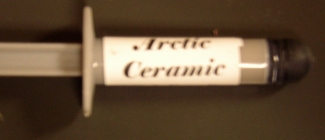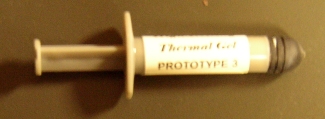
|
Computer Specials CaseCooler Computer Geeks CrazyPC Other Links |
Arctic Ceramic Prototype ReviewProvided by: Arctic
Silver Arctic Silver has been the leader in the Thermal Paste market for many years. A True Review was able to get a sneak preview of the new Arctic Ceramic. At this time we are only working with a prototype. The release date of Arctic Silver's new paste is also unknown at this time. The ceramic paste comes in a standard syringe and should coat about 15 to 20 processors.
Unfortunately, Arctic Silver does not have any statistics on their new product yet. Therefore, it is hard for me to say what the technical differences are between the ceramic paste and the silver paste. There are some obvious differences though. Arctic Ceramic has no silver content. This means that it won't short out your processor like Arctic Silver can. This also could mean that the heat transfer efficiency will be less than Arctic Silver's. Arctic Ceramic is a very tacky substance. Arctic Silver is a pain to remove from your skin if you get a bit of the substance on it. Arctic Ceramic is even tackier and causes you to have to scrub your skin to get it off. This is a good property. I normally use a credit card to spread thermal pastes. Spreading thermal paste over the core can be frustrating while trying to acheive the perfect, thin layer. The excess Arctic Silver will run down the side of the chip making cleanup some effort. Arctic Ceramic spreads perfectly and because its tackiness, the paste does not run off like Arctic Silver. When applying the heatsink, Arctic Ceramic acts like a little suction cup. If you try and move the heatsink a bit to clamp the clip on, you can feel the Arctic Ceramic bonding to the heatsink. This makes me believe that Arctic Ceramic allows less air to be trapped within its compound. Less air means more heat transfer; thus, more cooling. |
||
|
|



